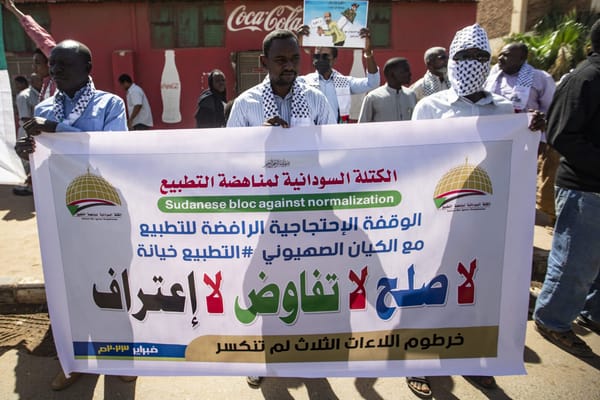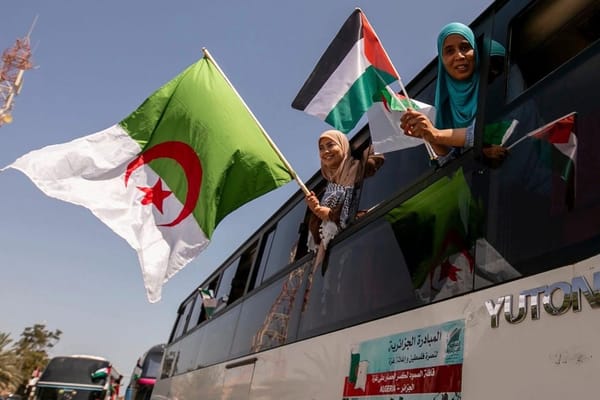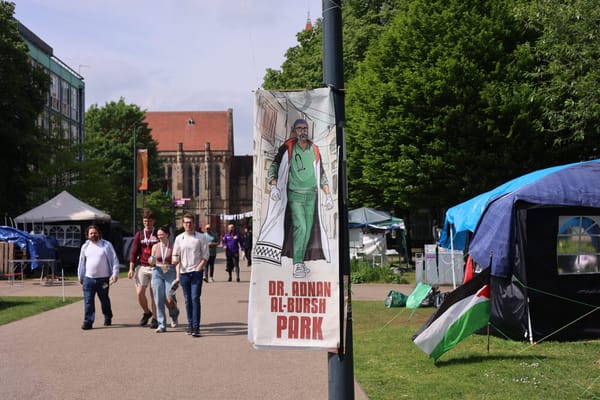The Abraham Accords and Sudan’s Global Counterrevolution



On October 23, 2020, Sudan became the third Arab-majority country to normalize relations with Israel under the Abraham Accords.
The deal between Israel and the civilian-military Sudanese Transitional Sovereignty Council (TSC)—formed after the popular revolution ousted President Omar al-Bashir in April 2019—was facilitated by the United Arab Emirates and the United States.
A few weeks before the signing, the Sudanese businessman and former member of parliament Abu Al-Qasim Bortom organized a delegation to travel to Israel and meet with Israeli organizations in order to accelerate the normalization process. Whether the visit happened is unclear, but Bortom justified his actions by stating that any sentiment Sudanese people had for Palestinian liberation was a result of ideological “brainwashing,” and that normalization with Israel would help Sudan “attract investment and have access to Western technology.”[1] By securing Sudan’s removal from the US state sponsors of terrorism list, normalization would entice foreign investors. In his remarks, he echoed General Mohamed Hamdan Dagalo, otherwise known as Hemedti, then vice-chairman of the TSC and head of the paramilitary Rapid Support Forces (RSF), who stated that Sudan quite simply needed Israel to achieve prosperity.
Rather than deliver prosperity to the Sudanese people, however, the Abraham Accords planted the seeds for the global co-optation of Sudan’s popular revolution. Only one year after the Accords were signed the dream of an eventual civilian-led, democratic government was deferred by the coup carried out by the military component of the TSC—the Sudanese Armed Forces (SAF) and the RSF—on October 25, 2021, against the civilian side of the transitional government. The eventual collapse of their military alliance on April 15, 2023 led to the outbreak of the ongoing war between the SAF and RSF.
The war halted any prospect of full diplomatic engagement with Israel. Yet, the negotiations and the political bargains the Accords generated were part of the wider web that connects authoritarian regimes across the region, from Israel to the UAE. The Abraham Accords prioritized the interests of transnational elites and ultimately extended the counterrevolutionary government’s monopoly over Sudan’s sovereignty, deepened the marginalization of civilians within the transitional government and reframed the revolution’s demands in transactional terms of aid, sanctions relief and access to global markets.
The broad-spectrum investment in normalization with Israel among Sudan’s civilian and military elite was unprecedented. In 1958, Sudan’s post-independence government had passed a law banning ties with the Zionist state. Many Sudanese critiqued the transitional government’s decision to normalize with Israel as a betrayal of Khartoum’s history as the place where the Arab states declared: “No to peace with Israel, no to recognition of the State of Israel, no to negotiations with Israel” in the wake of the Six Day War of 1967.
In response, the government offered a series of far-ranging justifications, each designed to suggest that Sudan’s future depended on normalization with Israel and cooperation with the West’s state-building project in the greater region. These claims were intended to assuage the outrage of those who marched in the streets in defiance of the decision and those who called attention to the indignities of the agreement.
Not only did opponents consider normalization a betrayal of the ethos of the revolution, but they also objected to the political alchemy that led to the agreement…
Not only did opponents consider normalization a betrayal of the ethos of the revolution, but they also objected to the political alchemy that led to the agreement and the concessions Sudanese people would have to make over their own sovereignty to secure the so-called benefits of the deal. The civilian Prime Minister Abdullah Hamdok urged the United States not to link Sudan’s removal from the state sponsors of terrorism list to the project of normalization with Israel. His argument was primarily logistical, not ideological, however: He stipulated that the transitional government did not have the authority to make political agreements on behalf of the Sudanese people. Only two months later, the minister of justice, Nasreldeen Abdulbari, an official signee of the Accords, claimed that the final decision about normalization did not require a democratic legislative council but could be agreed upon between the Sovereign Council and Hamdok’s cabinet.
In April 2021, Sudan repealed its 1958 law—a legal step intended to pave the way for the deal’s implementation. Still, the case of Sudan in this latest wave of normalization and state-making in the region is unusual. Unlike the other states that have entered the Abraham Accords, Sudan never formally signed or implemented the deal. Yet, the signing of the Abraham Accords in Sudan is critical to understanding how regional and global actors capture the symbols, rhetoric and imagination of local revolution to reorder the state, and the world, in their interests.
In a statement made on the day Sudan signed the Abraham Accords, then US Secretary of State Mike Pompeo confirmed that normalization with Israel would ensure Sudan’s removal from the state sponsors of terrorism list. Framing the deal as the culmination of the revolution, Pompeo, claimed Sudanese leaders had chosen to “build out their economy, to create democratic institutions—to do all the things that the Sudanese people have been demanding.”[2] His words collapsed the revolutionary impulses of the Sudanese people into the counterrevolutionary logics and grammars of the transitional government. Pompeo equated democratization to the compliance of authoritarian regimes with the Western imperial worldview. This framing was layered onto longer histories that are key to understanding Sudan’s postcolonial traumas.
Under Bashir in the 1990s, neoliberal economic policies that were designed to legitimize the Muslim Brotherhood’s capture of Sudan’s financial networks and consolidate the economy under the rule of the military government led to the privatization and outsourcing of state functions to militarized ethnic communities in Sudan’s rural regions. These quasi-state paramilitary forces maintained the political equilibrium that regulated the export of oil, agriculture, livestock and gold. Some of these militias oversaw site security at oilfields at the height of the oil boom, and presently they and the warring parties continue to safeguard the herds that cross the SAF and RSF de facto partition states and are later exported to markets in Libya and Egypt. These SAF-patroned militias maintained the consensus for Bashir’s rule among urban elites, while subjecting rural populations to dispossession and violence.
After the secession of South Sudan in 2011, Sudan’s oil revenues plummeted and gold became the state’s primary revenue source. Unlike other commodities, gold required direct security involvement. Labor-intensive, dispersed and difficult to regulate, it demanded control by armed actors. The SAF and its semi-independent paramilitary forces established private companies and partnered with foreign investors, most notably Russia’s Wagner Group and the United Arab Emirates. They financed the RSF’s expansion in the late 2010s. These fatal exchanges in Sudan’s political economy unfolded alongside the Saudi- and UAE-led campaign in Yemen, which hired Sudanese mercenaries, including children. In return, Emirati banks and financial institutions—both governmental and private—provided channels that supported the RSF’s ambitions in Sudan and across the wider Saharan region. Soldiers from the Sudanese army also made up a portion of these mercenary corps, but this period was especially formative to the RSF’s later ability to break away from its primary patron: the Sudanese Armed Forces.
By 2017, the RSF controlled the majority of gold mines in North Darfur. In that same year, they were officially incorporated into the SAF. Nonetheless, the militia maintained its financial and logistical autonomy with international partners and illicit transnational trade networks. In the years leading up to the revolution, and into today, the UAE has served as a critical destination for Sudanese gold exports, providing both markets and financial channels for Sudan’s militarized economy. Presently, Abu Dhabi has become so much a part of the supply chain of violent resource extraction in Sudan that it both reinforces the autonomy of paramilitary actors like the RSF and simultaneously funds the Sudanese Armed Forces, all the while deepening Sudan’s dependence on extractive, securitized revenue flows.
The military, however, only conceded to forming a power-sharing government with civilians if they could maintain their monopolies over Sudanese land, labor and the violence that regulates it.
After Bashir’s fall on April 6, 2019, the historical inequalities in Sudan’s economies of governance and capital persisted, despite the efforts of the Resistance Committees (RCs)—the largely non-hierarchical, community-based mutual aid networks and civil society groups that had formed the base of the revolution. In the immediate months of the transitional government between December 2019 and September 2020, the RCs largely advocated for the military’s investments to be under the control of the Ministry of Finance.[3] This change would have redistributed the power the Bashir regime and its allies had monopolized throughout the oil boom to expand the military state in the private sector. The military, however, only conceded to forming a power-sharing government with civilians if they could maintain their monopolies over Sudanese land, labor and the violence that regulates it.
The transitional government was thus ultimately tasked with priming Sudan for an influx of global investment, sustaining the liberal facade necessary to attract funds and maintaining the extractive economies that propped up the military state. Foundational problems in Sudan’s economy went unaddressed. Instead, the government embraced the International Monetary Fund’s standard program: financial support conditioned upon destabilizing austerity measures. The Abraham Accords formed part of the ideological casing for the new world order taking shape in Sudan through the co-optation of the Sudanese revolution.
Sudan’s removal from the US terrorism list—wrapped up as it was in the Abraham Accords and access to the IMF’s vision of economic reconstruction—was lauded as evidence of Sudan’s democratic progress. In reality, it perpetuated the military and civilian counterrevolutionary elite’s firm grasp on power and legitimized their violence as state-making.
The Accords were signed less than a year and a half after the Khartoum Sit-in Massacre of June 3, 2019, when hundreds of citizens protesting the military’s assumption of power after Bashir’s overthrow were killed by security forces. By August of that year, the civilian leadership had signed a power-sharing agreement with the SAF and RSF to govern Sudan together. Yet on the date of the signing, Pompeo made no mention of this violence or its roots in the military and civilian forces that had effectively taken the reins of the revolution from the revolutionaries. To the contrary, responding to a question about the link between normalization and Sudan’s removal from the state sponsor of terrorism list, he claimed that “these two leaders of Sudan did all the right things. We now have a civilian-led government inside of Sudan, and so the rationale for them being designated a state sponsor no longer made sense.”[4] Pompeo framed normalization as a solution to the problems raised by the revolution: “This will also be something that will help the Sudanese people and the Sudanese government. And you’ll see trade not only between Israel and Sudan, but between the United States and Sudan, as well.”
In addition to signing the Abraham Accords, to secure their removal from the list and access the benefits of trade, Sudan also had to pay the United States a $335 million settlement for the victims and families of the 1998 bombings at the US embassies in Dar es Salaam and Nairobi. During the 1990s, Sudan had harbored Osama bin Laden, the leader of Al Qaeda, who was accused of orchestrating the attacks. In retaliation for those bombings, the administration of President Bill Clinton had bombed the Al-Shifa pharmaceutical factory in Khartoum, which produced 90 percent of all medicines in Sudan and was the only factory in the country that made veterinary drugs. Unsurprisingly, this history went unmentioned in the fanfare surrounding Sudan’s signing of the Abraham Accords and in the mainstream media coverage of the settlement, as Sudanese civilians once again bore the costs of imperial bargains.
Israel’s growing involvement in Sudan must not only be contextualized in terms of the longer legacies of US hegemony but also newer forms of regional imperialism fostered by Israeli and Emirati expansion into Africa through their support of authoritarian regimes. Abu Dhabi Ports Group and Dubai Ports World are the UAE’s most lethal arm in the global war economy and counterrevolution in Africa. They have been essential to the UAE’s unchecked growth. Abu Dhabi Developmental Holding Company, the fourth largest Sovereign Wealth Fund in the world, owns AD Ports Group, and the Emirate of Dubai owns DP World. Together, these companies are operating or developing more than 22 ports in Africa. In June 2024, DP World announced it would invest over $3 billion to develop ports on the continent. DP World’s reach already includes 13 ports in Egypt, Tanzania, Somalia, Djibouti, Rwanda, Congo, Mozambique, Angola, Senegal and Algeria. As of January 2025, AD Ports Group holds rights over nine ports in Egypt, Congo and Guinea as well as contracts to manage the Pointe Noire Port in Congo and improve the Port of Luanda in Angola. It also previously held a contract to build and operate the proposed Port of Abu Amama in Sudan until it was cancelled by the Sudanese government amid the UAE’s involvement with the RSF
The UAE is ripping a page out of the playbook of nineteenth century imperialism, as it deliberately under-develops and exploits Africa and Africans and empowers authoritarian regimes in the region…
To guard these assets, the UAE has played a direct role in counterrevolutionary interventions in Yemen, Sudan, Ethiopia, Libya, Egypt and Chad, to list but a few. UAE-sponsored authoritarian regimes guarantee the government and its institutions access to African land and seaports in exchange for weapons, surveillance technologies, coup-proofing mechanisms and debt. The UAE is ripping a page out of the playbook of nineteenth century imperialism, as it deliberately under-develops and exploits Africa and Africans and empowers authoritarian regimes in the region that enable its worldwide profiteering. As both a corporate body and imperial government, the UAE extends itself into the Sahara and coastal Africa, particularly along land and sea routes that lead to the Mediterranean and the Indian Ocean by any means necessary. The state’s involvement in these countries has created a local geography that is made up of an expansive war economy and layered institutions of violence.
Having officially normalized with Israel just weeks before the signing of the Abraham Accords in Sudan, Abu Dhabi positioned itself as a broker and patron, pressuring Sudan to follow suit even in the face of domestic opposition. Emirati officials facilitated a secret February 2020 meeting in Uganda between General Abdel Fattah al-Burhan of the SAF and Israeli Prime Minister Benjamin Netanyahu—conspicuously excluding civilian Prime Minister Hamdok. This sidelining signaled the UAE’s preference for Sudan’s military rulers as the proper conduits for normalization. Just one week after Sudan reached the normalization agreement, the UAE dispatched more than half a billion dollars of aid to the country.
The Abraham Accords should not be understood as a discrete diplomatic agreement between empires and dictatorships but as a mechanism by which Sudan’s revolution was absorbed into a wider imperial order. The Accords reinforced the historical military state, suppressed the possibilities of the revolutionary moment and deepened Sudan’s entanglement with US, Emirati and Israeli projects of domination. This history is less a story about normalization than about how global powers strategically seize upon revolutionary conjunctures, strip them of their emancipatory potential and recycle them as instruments of authoritarian consolidation and imperial expansion.
[Bayan Abubakr is a PhD candidate in history at Yale University.]
[1] “Sudan businessman to visit Israel to accelerate normalisation process,” Middle East Monitor, October 17, 2020.
[2] “Remarks by President Trump Announcing Normalization of Relations Between Sudan and Israel,” Trump White House Archives, October 23, 2020.
[3] Muez Ali, Muzan Alneel, and Mayada Hassanain. “Conditionality Breeds Contempt: Donor and Multilateral Myopia in Sudan.” African Studies Review 67/4 (2024), pp. 863–87.
[4] “Remarks by President Trump Announcing Normalization of Relations Between Sudan and Israel,” Trump White House Archives, October 23, 2020.
Bayan Abubakr, "The Abraham Accords and Sudan’s Global Counterrevolution," Middle East Report 315/316 (Summer/Fall 2025).








